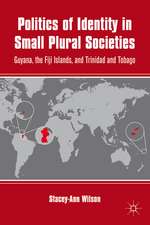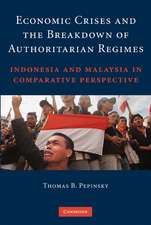Models of Democracy in Nordic and Baltic Europe: Political Institutions and Discourse: The Nordic Experience
Editat de Nicholas Aylotten Limba Engleză Paperback – 6 ian 2017
| Toate formatele și edițiile | Preț | Express |
|---|---|---|
| Paperback (1) | 469.34 lei 43-57 zile | |
| Taylor & Francis – 6 ian 2017 | 469.34 lei 43-57 zile | |
| Hardback (1) | 1062.62 lei 43-57 zile | |
| Taylor & Francis – 28 sep 2014 | 1062.62 lei 43-57 zile |
Preț: 469.34 lei
Nou
Puncte Express: 704
Preț estimativ în valută:
89.81€ • 94.00$ • 74.75£
89.81€ • 94.00$ • 74.75£
Carte tipărită la comandă
Livrare economică 31 martie-14 aprilie
Preluare comenzi: 021 569.72.76
Specificații
ISBN-13: 9781138707535
ISBN-10: 1138707538
Pagini: 284
Dimensiuni: 156 x 234 x 25 mm
Greutate: 0.45 kg
Ediția:1
Editura: Taylor & Francis
Colecția Routledge
Seria The Nordic Experience
Locul publicării:Oxford, United Kingdom
ISBN-10: 1138707538
Pagini: 284
Dimensiuni: 156 x 234 x 25 mm
Greutate: 0.45 kg
Ediția:1
Editura: Taylor & Francis
Colecția Routledge
Seria The Nordic Experience
Locul publicării:Oxford, United Kingdom
Cuprins
Contents: A Nordic model of democracy? Political representation in Northern Europe, Nicholas Aylott; Between flawed and full democracy: twenty years of Baltic independence, Kjetil Duvold; The emergence of Conservative parties in the Baltic States: new parties, party entrepreneurs and transnational influence, Karl Magnus Johansson; Ever more inclusive? Candidate selection in North European democracies, Nicholas Aylott, JÄnis Ikstens and Emelie Lilliefeldt; The diffusion of party positions: policy positions moving from the Nordic to the Baltic States, Detlef Jahn; The Nordic model and Estonian political discourse, Kadri Simm and Külliki Seppel; Conclusions: towards a new North European democracy?, Nicholas Aylott; Index.
Notă biografică
Nicholas Aylott is senior lecturer in political science at Södertörn University, Sweden. His main academic interest is in comparative European politics, with a special focus on political parties. He is the author and co-author of various books and articles, often with a focus on Nordic party politics.
Recenzii
'The book as a whole is an excellent collection of essays - each contributing both to the field of comparative analysis overall and also to their own separate research inquiries. There will be a different audience for each individual essay, but those focussing on domestic party politics in Europe will find these essays highly thought-provoking.' LSE Review of Books
Descriere
This book explores the ways in which representative democracy works in two neighbouring collections of European states: the Nordic (Denmark, Finland, Iceland, Norway and Sweden) and the Baltic (Estonia, Latvia and Lithuania). The central, guiding questions are: how does political representation work in countries that have a lot in common, but also a few significant contextual dissimilarities; and what, if any, relationships between the respective styles of democracy can be identified? Using a variety of theories, perspectives and methods, the empirical studies that populate the book seek to offer reflections on these questions.


















